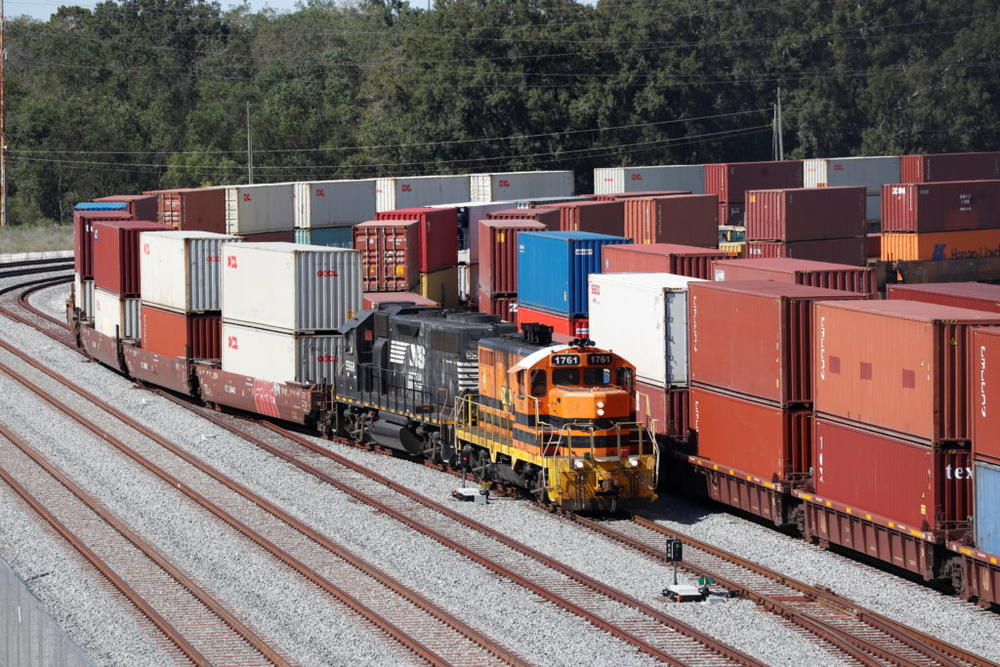
Caption
A commercial freight train carries a load of shipping containers at the Port of Savannah, Georgia, U.S. October 17, 2021. Photo by Octavio Jones/REUTERS
|Updated: September 15, 2022 5:19 PM

A commercial freight train carries a load of shipping containers at the Port of Savannah, Georgia, U.S. October 17, 2021. Photo by Octavio Jones/REUTERS
Commuters, food producers, refineries and others could all be affected if there is a nationwide rail strike at the end of this week.
The Biden administration was putting pressure on railroads and unions Wednesday to settle their differences and avert a strike. But just in case that doesn't work, the administration was also working on a plan to use trucks and planes to move goods that are normally carried by freight railroads.
READ MORE: 1 union rejects tentative deal days ahead of rail strike deadline
Business groups are telling Congress to step in and block a strike.
Here are key things to know ahead of a possible strike this Friday.
The nation's biggest freight railroads began negotiating with a dozen different unions representing about 115,000 workers in late 2019, but talks were slowed by the pandemic, which limited face-to-face meetings.
Many of the unions have reached tentative agreements with the railroads, but two large unions representing engineers and train conductors have held out for better terms.
Government mediators tried to broker agreements, but that didn't work. President Joe Biden then appointed a presidential emergency board, which held hearings and issued recommendations last month that included 24 percent pay raises and thousands of dollars in bonuses.
By federal law, the unions can't legally strike until after Friday morning, just after midnight. That's when a 30-day "cooling-off" period ends, under terms of a law called the Railway Labor Act, which governs contract talks in the railroad and airline industries.
Congress could intervene and impose settlement terms, as it has done in previous nationwide rail-labor disputes.
Lawmakers could adopt the recommendations of the emergency board, or they could order additional negotiations or arbitration to settle the standoff.
Congress is widely expected to block a strike if it comes to that, but it is not clear how quickly lawmakers would act.
Rail workers stayed on the job throughout the pandemic but have not received a raise since 2019.
The unions sought raises of 31 percent over the five-year term of the new contracts, while the railroads offered 17 percent before the emergency board's recommendations. The largest railroads endorsed the board's middle-ground proposals, and most of the unions have reached tentative agreements based on those details.
READ MORE: Biden intervenes in railroad contract to block strike
However, the Brotherhood of Locomotive Engineers and Trainmen, and the transportation division of the International Association of Sheet Metal, Air, Rail and Transportation Workers, which represents conductors, have held out in hopes of better terms. They want railroads to increase staffing -- the major railroads have cut nearly one-third of their jobs in the last six years -- and to ease strict attendance policies that make it difficult to take time off.
Railroads such as Union Pacific, BNSF, CSX and Norfolk Southern carry cars, coal, chemicals, grain, imported goods and other products and raw materials throughout the country. A shutdown -- even a brief one -- would delay critical shipments and ripple across the economy.
The Association of American Railroads trade group estimates that a strike would cost the economy $2 billion a day.
About 300,000 barrels of crude oil is shipped by rail every day, and refineries might have to slow production if deliveries are delayed, according to the American Fuel & Petrochemical Manufacturers. Analysts warn there could be shortages of gasoline and diesel in some places such as the Northeast.
Most new vehicles are shipped from the factory or dock by rail, and analysts say there is not enough truck capacity to handle all those vehicles in case of a strike. That would mean even longer wait times for dealers and motorists to get their hands on new cars.
A strike could also interfere with production because automakers receive some parts and raw materials by rail.
The railroads have announced plans to stop shipping refrigerated items ahead of the strike deadline, so there could be disruptions in deliveries of produce, meat and other items.
Food producers could be affected too, leading to longer-lasting effects. Agricultural groups say that even a brief strike would interrupt shipment of feed to livestock and poultry producers.
Disruptions are likely because many passenger railroads operate on tracks owned by the big freight railroads.
Amtrak uses its own track in much of the corridor from Washington to Boston, but relies on freight track most everywhere else. Earlier this week, Amtrak suspended the California Zephyr and Empire Builder lines that run from Chicago to the West Coast, and planned to stop several other long-distance lines on Wednesday.
The Chicago area's Metra commuter line said Wednesday that if there is a strike it will suspend operations on four of its 11 lines Friday.
The White House is clearly worried that any disruption in supply chains just weeks before the November midterm elections could anger consumers, who are already facing the highest inflation in 40 years. That could hurt Democrats, who are trying to protect razor-thin control of the Senate and House.
White House press secretary Karine Jean-Pierre said the administration has told the railroads and unions that American families, business and farms would suffer. She said a strike is "not acceptable."